Medieval History
Medieval History
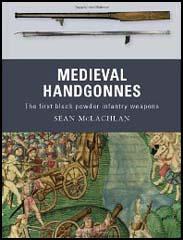
Title: Medieval Handgonnes
Author: Sean McLachlan
Editor:
Publisher: Osprey
Price: £12.99
Bookshop: Amazon
Spartacus Website: Medieval Warfare
Category:
In the early 14th century, a new weapon entered the arsenals of European armies. This first generation of black powder weapons put fear into the heart of the enemy and in 1453 Ottoman cannon succeeded in pummelling the once-impregnable walls of Constantinople. But cannons, which are both slow and cumbersome, were difficult to use and often proved inaccurate. The first handgonnes were the answer. Easily dismissed by later historians as nothing more than crude tubes that shot wildly inaccurate lead balls, more recent research has revealed the true accuracy of the medieval handgonne together with its penetrative power. This volume, complete with detailed illustrations and colour photographs of reconstructed handgonnes, reveals the true history of what could easily have been the most revolutionary weapon in history. This book will be a must for medieval enthusiasts and re-enactors.
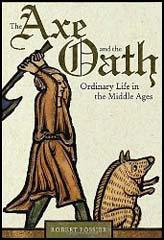
Title: The Axe and the Oath
Author: Robert Fossier
Editor:
Publisher: Princeton University Press
Price: £24.95
Bookshop: Amazon
Spartacus Website: Medieval Farming
Category:
In "The Axe and the Oath", one of the world's leading medieval historians presents a compelling picture of daily life in the Middle Ages as it was experienced by ordinary people. Writing for general readers, Robert Fossier vividly describes how these vulnerable people confronted life, from birth to death, including childhood, marriage, work, sex, food, illness, religion, and the natural world. While most histories of the period focus on the ideas and actions of the few who wielded power and stress how different medieval people were from us, Fossier concentrates on the other nine-tenths of humanity in the period and concludes that 'medieval man is us'. Drawing on a broad range of evidence, Fossier describes how medieval men and women encountered, coped with, and understood the basic material facts of their lives. We learn how people related to agriculture, animals, the weather, the forest, and the sea; how they used alcohol and drugs; and, how they buried their dead. But "The Axe and the Oath" is about much more than simply the material demands of life. We also learn how ordinary people experienced the social, cultural, intellectual, and spiritual aspects of medieval life, from memory and imagination to writing and the Church. The result is a sweeping new vision of the Middle Ages that will entertain and enlighten readers.
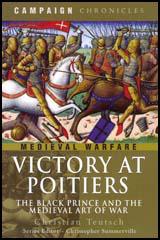
Title: Victory at Poitiers
Author: Christian Teutsch
Editor:
Publisher: Pen & Sword
Price: £19.99
Bookshop: Amazon
Spartacus Website: 100 Years War
Category:
On 13 September 1356 near Poitiers in western France, the small English army of Edward, the Black Prince crushed the forces of the French King Jean II in one of the most famous battles of the Hundred Years' War. Over the centuries the story of this against-the-odds English victory has, along with Crécy and Agincourt, become part of the legend of medieval warfare. And yet in recent times this classic battle has received less attention than the other celebrated battles of the period. The time is ripe for a reassessment, and this is the aim of Christian Teutsch's thought-provoking new account.
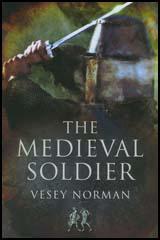
Title: The Medieval Soldier
Author: Vesey Norman
Editor:
Publisher: Pen & Sword
Price: £12.99
Bookshop: Amazon
Spartacus Website: Norman Knights
Category:
The author outlines the development of the undisciplined barbarian war bands of the Dark Ages into the feudal armies of the early Middle Ages. It deals with the arms and equipments of the soldier, not only from surviving specimens but also from descriptions in contemporary medieval documents. Vesey Norman covers the slow development of tactics and the transition of the warrior from a personal follower of a war leader to the knight who served his feudal overlord as a heavily armoured cavalryman in return for land. He details the attitude of the Church to warfare, the rise of chivalry and the development of the knights of the military orders, the Templars, the Hospitallers and the Teutonic Knights. He answers such questions as what classes of men made up the army, who commanded them, and how they were equipped, paid and organized.
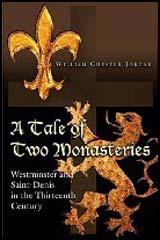
Title: The Tale of Two Monasteries
Author: William Chester Jordan
Editor:
Publisher: Princeton University Press
Price: £19.95
Bookshop: Amazon
Spartacus Website: Medieval Websites
Category:
A Tale of Two Monasteries takes an unprecedented look at one of the great rivalries of the Middle Ages and offers it as a revealing lens through which to view the intertwined histories of medieval England and France. This is the first book to systematically compare Westminster Abbey and the abbey of Saint-Denis--two of the most important ecclesiastical institutions of the thirteenth century--and to do so through the lives and competing careers of the two men who ruled them, Richard de Ware of Westminster and Mathieu de Vendôme of Saint-Denis. Esteemed historian William Jordan weaves a breathtaking narrative of the social, cultural, and political history of the period. It was an age of rebellion and crusades, of artistic and architectural innovation, of unprecedented political reform, and of frustrating international diplomacy--and Richard and Mathieu, in one way or another, played important roles in all these developments. Jordan traces their rise from obscure backgrounds to the highest ranks of political authority, Abbot Richard becoming royal treasurer of England, and Abbot Mathieu twice serving as a regent of France during the crusades. By enabling us to understand the complex relationships the abbots and their rival institutions shared with each other and with the kings and social networks that supported and exploited them, A Tale of Two Monasteries paints a vivid portrait of medieval society and politics, and of the ambitious men who influenced them so profoundly.
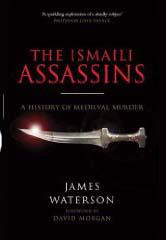
Title: The Ismaili Assassins
Author: James Waterson
Editor:
Publisher: Frontline Books
Price: £19.99
Bookshop: Amazon
Spartacus Website: Medieval World
Category:
The Ismaili Assassins were an underground group of political killers who were ready to kill Christians and Muslims alike with complete disregard for their own lives. These devoted murderers were under the powerful control of a grand master who used assassination as part of a grand strategic vision that embraced Egypt, the Levant and Persia and even reached the court of the Mongol Khans in far away Qaraqorum. The Assassins were meticulous in their killing. They often slayed their victims in public, thereby cultivating their terrifying reputation. They assumed disguises and their weapon of choice was a dagger. The dagger was blessed by the grand master and killing with it was a holy and sanctified act - poison or other methods of murder were forbidden to the followers of the sect. Surviving a mission was considered a deep dishonour and mothers rejoiced when they heard that their Assassin sons had died having completed their deadly acts. Their formidable reputation spread far and wide. In 1253, the Mongol chiefs were so fearful of them that they massacred and enslaved the Assassins' women and children in an attempt to liquidate the sect. The English monarch, Edward I, was nearly dispatched by their blades and Richard the Lionheart's reputation was sullied by his association with the Assassins' murder of Conrad of Montferrat. The Ismaili Assassins explores the origins, actions and legacy of this notorious sect. Enriched with eyewitness accounts from Islamic and Western sources, this important book unlocks the history of the Crusades and the early Islamic period, giving the reader entry into a historical epoch that is thrilling and pertinent.
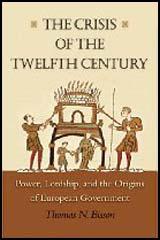
Title: The Crisis of the Twelfth Century
Author: Thomas N. Bisson
Editor:
Publisher: Princeton University Press
Price: £19.95
Bookshop: Amazon
Spartacus Website: Medieval World
Category:
Medieval civilization came of age in thunderous events like the Norman Conquest and the First Crusade. Power fell into the hands of men around castles who imposed coercive new lordships in quest of nobility, heedless of the old public order. In The Crisis of the Twelfth Century, acclaimed historian Thomas Bisson asks what it was like to live in a Europe without government, and he asks how people experienced power, and suffered. Rethinking a familiar history as a problem of origins, he explores the circumstances that impelled knights, emperors, nobles, and churchmen to infuse lordship with social purpose. Bisson traces the origins of European government to a crisis of lordship and its resolution. King John of England was only the latest and most conspicuous in a gallery of bad lords who dominated the populace instead of ruling it. Men like him had been all too commonplace in the twelfth century. More and more knights pretended to powers and status, encroached on clerical domains and exploited peasants, and came to seem threatening to social order and peace. Yet as Bisson shows, it was not so much the oppressed people as their tormentors who were in crisis. Covering all of Western Christendom, this book suggests what these violent people--and the outcries they provoked--contributed to the making of governments in kingdoms, principalities, and towns. The Crisis of the Twelfth Century is an unparalleled cultural history of power in medieval Europe, and a monumental achievement by one of today's foremost medievalists.
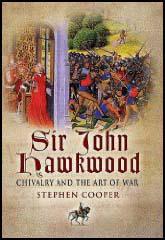
Title: Sir John Hawkwood
Author: Stephen Cooper
Editor:
Publisher: Pen & Sword
Price: £19.99
Bookshop: Amazon
Spartacus Website: Hundred Years War
Category:
In Florence cathedral hangs a remarkable portrait by Uccello of Sir John Hawkwood, the English soldier of fortune who commanded the Florentine army at the age of 70 and earned a formidable reputation as one of the foremost mercenaries of the late middle ages. His life is an amazing story. He rose from modest beginnings in an Essex village, fought through the French campaigns of Edward III, went to Italy when he was 40 and played a leading role in ceaseless strife of the city-states that dominated that country. His success over so many years in such a brutal and uncertain age was founded on his exceptional skill as a soldier and commander, and it is this side of his career that Stephen Cooper explores in this perceptive and highly readable study.
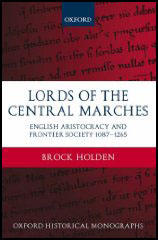
Title: Lords of the Central Marches
Author: Brock Holden
Editor:
Publisher: Oxford University Press
Price: £55.00
Bookshop: Amazon
Spartacus Website: Henry II
Category:
In the Middle Ages, the March between England and Wales was a contested, militarised frontier zone, a 'land of war'. With English kings distracted by affairs in France, English frontier lords were left on their own to organize and run lordships in the manner that was best suited to this often violent borderland. The centrepiece of the frontier society that developed was the feudal honour and its court, and in the March it survived as a functioning entity much longer than in England. However, in the twelfth century, as the growing power of the English crown threatened Marcher honours, their lords asserted their independence from the king's courts, and the March became a land where 'the king's writ did not run'. At the same time, the increased military capability of their Welsh adversaries put the Marcher lordships under enormous military and financial strain. Brock Holden describes how this unusual frontier society developed in reaction to both the challenge of the native Welsh and the power of the English kings.Through a multi-faceted examination-political, economic, social, legal, and military-of the lordships of the Central March of Wales, it examines how the 'feudal matrix' of Marcher power developed over the course of the eleventh to thirteenth centuries.
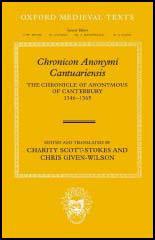
Title: The Chronicle of Anonymous of Canterbury 1346-1365
Author:
Editor:
Publisher: Oxford University Press
Price: £80.00
Bookshop: Amazon
Spartacus Website: Medieval Literature
Category:
This is the first complete edition of the Chronicon Anonymi Cantuariensis, a contemporary narrative that provides valuable insights into medieval war and diplomacy, written at Canterbury shortly after the mid-fourteenth century. The previous edition, published in 1914, was based on a manuscript from which the text for the years 1357 to 1364 was missing. Presented here in full with a modern English translation, the chronicle provides a key narrative of military and political events covering the years from 1346 to 1365. Concentrating principally on the campaigns of the Hundred Years War and their impact upon the inhabitants of south-east England, the author took advantage of his position on the main news route between London and Paris to provide a detailed account of a crucial phase in British and European history.
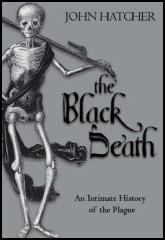
Title: The Black Death
Author: John Hatcher
Editor:
Publisher: Weidenfeld & Nicolson
Price: £20.00
Bookshop: Amazon
Spartacus Website: Disease in the 14th Century
Category:
The Black Death remains the greatest disaster to befall humanity, killing about half the population of the planet in the 14th century. John Hatcher recreates everyday medieval life in a parish in Suffolk, from which an exceptional number of documents survive. This enables us to view events through the eyes of its residents, revealing in unique detail what it was like to live and die in these terrifying times. With scrupulous attention to historical accuracy, John Hatcher describes what the parishioners experienced, what they knew and what they believed. His narrative is peopled with characters developed from the villagers named in the actual towns records and a series of dramatic scenes portray how contemporaries must have experienced the momentous events.
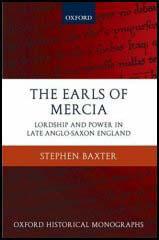
Title: The Earls of Mercia
Author: Stephen Baxter
Editor:
Publisher: Oxford University Press
Price: £60.00
Bookshop: Amazon
Spartacus Website: King Harold II
Category:
Offering a fresh interpretation of power structures and political patterns in late Anglo-Saxon England, this book focuses on the family of Ealdorman Leofwine, which obtained power in Mercia, and retained it throughout an extraordinary period of political upheaval between 994 and 1071. The house of Leofwine survived events such as the Viking wars, a palace revolution in 1006-7, and further rounds of political bloodletting during the reign of Æthelred 'the Unready'. It maintained power through Cnut's conquest of 1016, the explosive factional politics of Edward the Confessor's reign, the battles of 1066, and even the first few years of William the Conqueror's reign. Stephen Baxter examines why this family retained power for so long, and why it eventually fell. Offering the first extended treatment of the nature and limits of earls' power, The Earls of Mercia is a reappraisal of the structure of land tenure and the mechanics of royal patronage, and provides a new perspective from which to explore how noble families used religious patronage to strengthen local power structures. Reconstructing pre-Conquest lordship using Domesday evidence, it is the first sustained attempt to explore the relationship between local and national politics,
offering a major new interpretation of the whole structure of the early English kingdom on the eve of its demise.
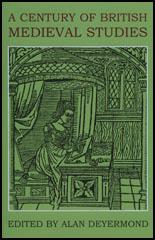
Title: A Century of British Medieval Studies
Author: Alan Deyermond
Editor:
Publisher: Oxford University Press
Price: £70.00
Bookshop: Amazon
Spartacus Website: Medieval World Index
Category:
This is an authoritative guide to the complete range of medieval scholarship undertaken in twentieth-century Britain: history, archaeology, language, culture. Some of the twenty-nine essays focus on changes in research method or on the achievements of individual scholars, others are the personal account of a lifetime's work in a discipline. Many outline the ways in which subjects may develop in the twenty-first century.
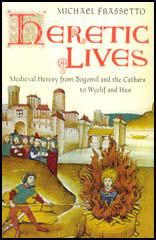
Title: Heretic Lives - Medieval Heresy
Author: Michael Frassetto
Editor:
Publisher: Profile
Price: £20.00
Bookshop: Amazon
Spartacus Website: Medieval World Index
Category:
Through the lives of individuals, Michael Frassetto enters the dark history of the great medieval heretical movements - the lives of men and women whose ideas and actions had, by the end of the Middle Ages, transformed utterly the religious and political map of Europe. Michael Frassetto's account of five centuries of social and spiritual turmoil is a vivid and telling mix of events, personality and ideas. His cast of characters includes Bogomil, an obscure priest of the Balkan countryside who introduced 'Manichaean' ideas to his parishioners; Henry the monk, the first true heresiarch, who eluded his captors and prepared Languedoc for the Cathars; Valdes the rich merchant who renounced worldly goods to found the movement that would evolve into the Waldensian Church; Pierre Autier, last of the Cathar 'perfects'; and John Wyclif the gentle Oxford scholar who with his disciple the Czech priest Jan Hus - the first disinterred from his grave in an English country churchyard, the other burnt as an urban spectacle - heralded the Reformation. This is history replete with passion, terror and hope, a key to the heart of medieval Europe.
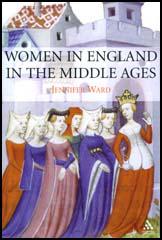
Title: Women in England in the Middle Ages
Author: Jennifer Ward
Editor:
Publisher: Continuum
Price: £30.00
Bookshop: Amazon
Spartacus Website: Medieval World Index
Category:
"Women in England in the Middle Ages" looks at 'all sorts and conditions' of women from c.500 to c.1500 A.D., concentrating on common experiences over their life-cycle, as daughters, wives and mothers, and the contrasts derived from their position in the social hierarchy. Most women lived out their lives in their own village or town, but queens and noblewomen exercised power and patronage locally and at the royal court. Religion played a significant part in women's lives; some became nuns and abbesses, while the majority were involved in their own parish and community. Inevitably, women's lives changed over time, but, in bringing up their children and balancing family and work, medieval women faced many of the problems of their modern counterparts.
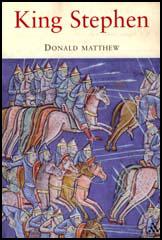
Title: King Stephen
Author: Donald Matthew
Editor:
Publisher: Continuum
Price: £16.99
Bookshop: Amazon
Spartacus Website: King Stephen
Category:
The reign of King Stephen (1135-54) has usually been seen as uniquely disastrous in the history of the medieval England - a country riven by a civil war between Stephen and his first cousin, the Empress Matilda, and by an anarchy during which barons laid waste the country and 'Christ and his saints slept'. Donald Matthew challenges this picture. By questioning such melodramatic assumptions, and by looking clearly at what can and cannot be known about Stephen, he brings new light to both the king and his reign. He shows that much of what has been written about Stephen has been based on the selective use of the testimony of hostile witnesses, and has been shot through by wishful thinking or by the political or historical prejudices of the day. "King Stephen" is an important, well-written and timely reinterpretation of the crisis of Norman government.
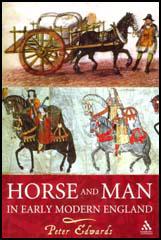
Title: Horse and Man in Early Modern England
Author: Peter Edwards
Editor:
Publisher: Continuum
Price: £35.00
Bookshop: Amazon
Spartacus Website: Medieval Village
Category:
Horses were used for many purposes in Shakespeare's England: for travel, either on horseback or in carriages, for haulage and for pleasure, and for work in the fields. The upper classes were closely involved with horses, for jousting, hunting and racing. Horses was also essential to any army, both as cavalry and to draw supplies and artillery. Horse ownership was, however, much more widespread than might be imagined. "Horses in Shakespeare's England" shows how, in pre-industrial England, horses were bred and trained, what they ate, how much they were worth, how long they lived, and what their owners thought of them. While they were named individually, and sometimes became favourites, many were worked hard and poorly treated, leading to their early deaths. They were, nevertheless an essential part of the life of the time and are strikingly depicted in literature and art, as well in many other records.
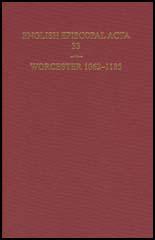
Title: English Episcopal Acta: Worcester 1062-1185
Author:
Editor: Mary Cheney
Publisher: Oxford University Press
Price: £45.00
Bookshop: Amazon
Spartacus Website: Medieval World
Category:
The area comprising what became the counties of Cumberland and Westmorland was long disputed, both politically and ecclesiastically, between the English and Scottish kingdoms. The bishopric of Carlisle was the last see in England to be created before the Reformation changes of the 1540s. This latest volume in the English Episcopal Acta series brings together for the first time an edition of all the surviving charters issued by bishops of Carlisle from 1133 until the death of Bishop Ralph de Ireton in 1292. The extant charters provide great insights into the episcopal administration of this border bishopric for the first 150 years of the see's existence. The introduction provides an account of the diocese, the bishops and their households, discussion of the diplomatic aspects and style of the surviving charters and the episcopal seals. Offering fresh insights into this formative period of English history, this volume will be of interest to scholars and students of ecclesiastical, medieval and local history.
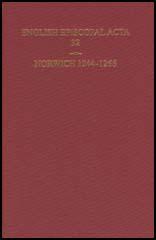
Title: English Episcopal Acta: Norwich 1244-1266
Author:
Editor: Christopher Harper-Bill
Publisher: Oxford University Press
Price: £45.00
Bookshop: Amazon
Spartacus Website: Medieval World
Category:
This volume collects together the 198 acta issued by Bishops Walter Suffield and Simon Walton of Norwich. The development of the diocese of Norwich is outlined in English Episcopal Acta 6, Norwich 1070-1214. Although the rapid multiplication of houses of monks, canons and nuns which had characterised the century and a half after the Norman Conquest had slackened in pace, the period covered by this volume saw the foundation of two nunneries, Marham and Flixton, and the establishment by Bishop Suffield himself of a major new hospital, St Giles in Norwich.
